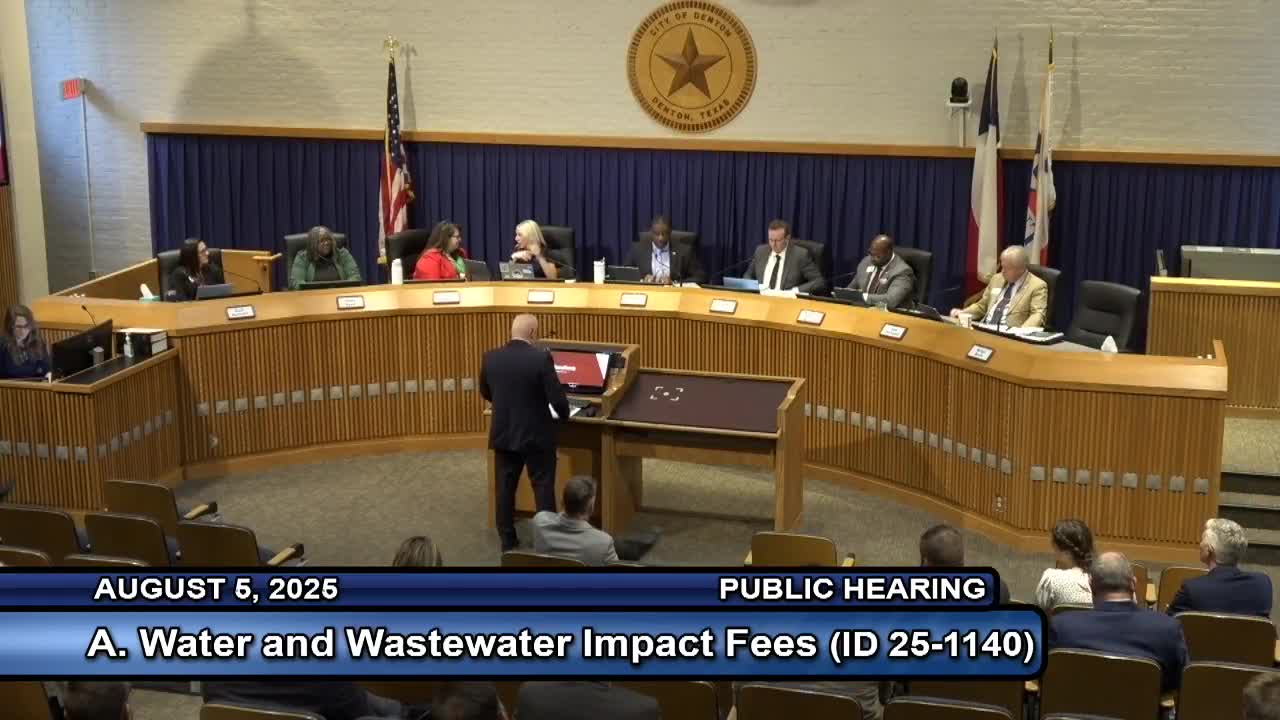Denton Council Discusses Impact Fees Amid Housing Affordability Concerns
August 05, 2025 | Denton City, Denton County, Texas
This article was created by AI summarizing key points discussed. AI makes mistakes, so for full details and context, please refer to the video of the full meeting. Please report any errors so we can fix them. Report an error »

During the recent Denton City Council meeting, significant discussions centered around the city's water and wastewater impact fees, which are crucial for managing the growing population and infrastructure needs. The council deliberated on the implications of these fees, particularly in light of the city's projected population growth and the associated demands on water services.
City officials highlighted that the population is a key driver for both residential and commercial growth, which in turn affects water and wastewater capacity. Current projections indicate that Denton is experiencing a growth rate of 3.6% for water and 4.1% for wastewater, surpassing earlier estimates from 2018. This growth necessitates careful planning and investment in infrastructure to ensure adequate service delivery.
A notable point of contention arose regarding the impact fees charged to developers. While the city charges the same fees for services inside and outside its corporate limits, there is concern about fairness for residents who pay taxes versus those who do not. Some council members expressed the need to reevaluate these fees to ensure that they do not inadvertently incentivize development outside city limits, which could undermine local taxpayers.
The council also discussed the recent decision to reduce the impact fees from 100% to 75% of the maximum rate, a move that was partly in response to feedback from the development community. This reduction aims to balance the financial burden on developers while still ensuring that future growth can be adequately supported. However, representatives from the Dallas Builders Association cautioned that even at 75%, the fees could significantly impact housing affordability, potentially pricing out families and reducing the number of homes built in Denton.
As the council navigates these complex issues, the focus remains on ensuring that infrastructure investments align with community needs and growth projections. The discussions underscore the importance of transparency and accountability in how the city manages its resources and commitments to residents. Moving forward, the council will continue to assess the impact of these fees and their implications for Denton's future development and housing market.
City officials highlighted that the population is a key driver for both residential and commercial growth, which in turn affects water and wastewater capacity. Current projections indicate that Denton is experiencing a growth rate of 3.6% for water and 4.1% for wastewater, surpassing earlier estimates from 2018. This growth necessitates careful planning and investment in infrastructure to ensure adequate service delivery.
A notable point of contention arose regarding the impact fees charged to developers. While the city charges the same fees for services inside and outside its corporate limits, there is concern about fairness for residents who pay taxes versus those who do not. Some council members expressed the need to reevaluate these fees to ensure that they do not inadvertently incentivize development outside city limits, which could undermine local taxpayers.
The council also discussed the recent decision to reduce the impact fees from 100% to 75% of the maximum rate, a move that was partly in response to feedback from the development community. This reduction aims to balance the financial burden on developers while still ensuring that future growth can be adequately supported. However, representatives from the Dallas Builders Association cautioned that even at 75%, the fees could significantly impact housing affordability, potentially pricing out families and reducing the number of homes built in Denton.
As the council navigates these complex issues, the focus remains on ensuring that infrastructure investments align with community needs and growth projections. The discussions underscore the importance of transparency and accountability in how the city manages its resources and commitments to residents. Moving forward, the council will continue to assess the impact of these fees and their implications for Denton's future development and housing market.
View full meeting
This article is based on a recent meeting—watch the full video and explore the complete transcript for deeper insights into the discussion.
View full meeting
